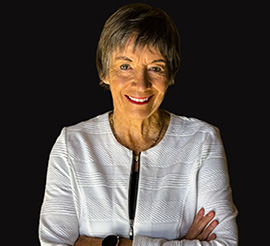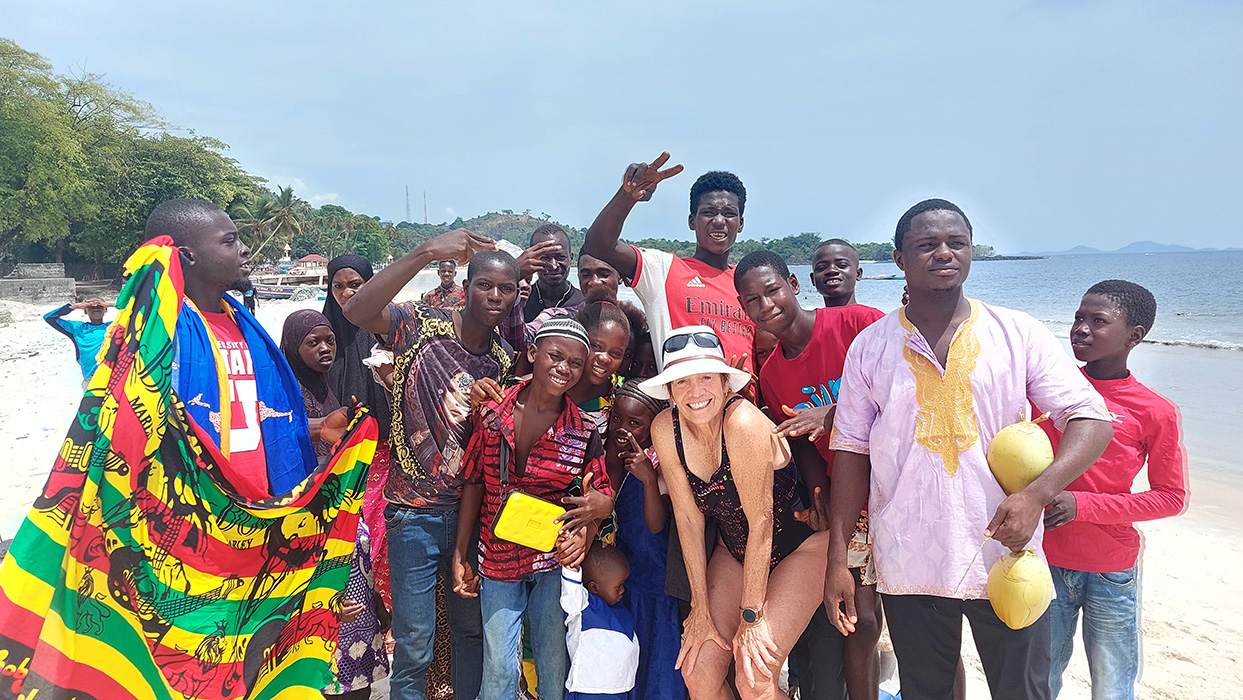When one thinks of luxury cruising, one seldom thinks of West Africa. More likely, Ghana, Sierra Leone and the Congo conjure images of famine, danger and slaves crammed into overcrowded vessels sailing to North America.
Think again. Swan Hellenic’s recently built SH Vega now transports 100 privileged passengers in 5-star comfort to explore one of the least visited parts of this planet.
The Scandinavian-styled ship, committed to sustainability, is on its inaugural cruise up the Atlantic Coast of Africa. I join in Angola, where we leave Luanda, the oil-rich capital with its mix of skyscrapers, shanty towns and beachfront, to head thousands of kilometres north to Senegal; a dozen countries, 27 days and countless memories. Amidst the diversity of this vast continent where culture, colour and chaos collide, we devour food for thought during day excursions and sumptuous meals back on board at night, supported by a fabulous crew from 22 nations.
The microcosm of wildly individual characters includes a Georgian oligarch, Bollywood mogul, Brazilian TV star, British war correspondent and French penguin expert. Undertaking this ‘soft’ adventure together, a former New Zealand parliamentarian, his partner and I are the only Antipodeans.
At Point-Noire in the Congo, we are greeted by dancers, drummers, the Prime Minister and media as the first cruise ship to dock. Police-escorted minibuses transport us to one of many monuments marking the travesties of slavery; that scarred the history of this entire coastline, even before colonisation. The next day promises exploration of the Congo rainforest basin; the second-largest after the Amazon. A high tide prevents safe landing. We return to the container wharf, disgruntled; until the charming wife of Swan Hellenic’s CEO persuades the PM to supply military helicopters to showcase this rugged wilderness.
FLIGHT OF FANCY
Fifteen passengers per trip clamber into Russian M18s with Ukrainian pilots in camouflage gear smoking cigarettes. Clutching plastic garden chairs with no seat belts, we safely skim the treetop canopy to land metres from a chimpanzee rescue colony. Back at the ship, less risk adverse – and possibly more sensible – passengers murmur mutiny while I float softly to sleep between crisp white sheets, wondering if I’d only dreamt of the day that was.
I awake Easter Sunday in waters off Gabon with rabbits in my cabin – Lindt chocolate rabbits. Jeeps bump through the jungle but no surfing hippos appear. Nature makes no guarantees and our only certainty is the sophisticated elegance of the ship. Gabon, inhabited for over 400,000 years, is recently oil rich, but surely Libreville doesn’t consume more Champagne per capita than Paris.
We head offshore to the tiny island nation of São Tomé and Principe; a volcanic chain near the equator. Since independence from Portugal, once grand colonial buildings of previously prosperous coffee, cocoa and sugar plantations, stand crumbling.
In Principe, tropical flowers dot lush green rock formations that edge into shores of turquoise waters; reminiscent of the South Pacific some 40 years ago. Time seems to have stood still as kids in neat school uniforms run barefoot to greet their teachers, who have been commandeered as guides for the day as we ride their school buses.
We’re feeling pretty chilled back in the comfort of our cabins with plentiful power outlets, USB ports and mood lighting. There’s also individual espresso machines, 24-hour room service, gratuities and excursions all included in the price. Clothes in the eco-friendly laundry, me in a fluffy white bathrobe, I’m thinking of stowing away in the supersized wardrobe. Or maybe hiding from pirates, when we learn that only a few nautical miles away, crew from a Danish freighter have been kidnapped. Unconcerned, the captain calmly explained pre-planned security; razor wire on the hull, water cannons by the pool and blackout curtains. There’s sophisticated satellite surveillance, plus a Nigerian naval warship to accompany us up the notorious Gulf of Guinea. What an adventure!
WORLD OF VOODOO
Next stop is an Egun mask ceremony amidst the brightly coloured fishing village of Ganvie in Benin, built on stilts to originally deter slave traders. The government formally recognises voodoo as a religion and daily life unfolds peacefully on the water as kids pole home from school in canoes.
Another voodoo ceremony awaits in neighbouring Togo; this tribe is in a throbbing trance-like state. Frankly, somewhat less authenticity would have been preferrable, as a goat’s throat is slit before our very eyes. Most of us forego the fetish market and return to gentler tones of the grand piano and shipside sunset. We are greeted in Ghana’s Independence Square by thousands at a revival
meeting, shops displaying signage ‘Charismatic Christian café’, ‘Blessed Clothing’, and ‘Biblical Auto Parts.’ A young influencer from Accra shares a refreshing insight about today’s emerging middle class.
Inevitably an inaugural expedition wouldn’t always go according to plan in such challenging ports of call. Still, it was surprising to return from an orphanage at the Ivory Coast, and discover the onshore excursion leader had been replaced, along with a guest lecturer who’d publicly sworn at a passenger. He should have taken lessons in diplomacy from another presenter; a former American ambassador to Rwanda and wealth of information about Africa, home to the poorest countries in the world, including Sierra Leone.
Ravaged by Ebola, COVID-19 and years of civil war, devastation is on display the moment we disembark; from amputees outside the national museum to a beach patrolled by security guards with rifles. As a volunteer lifesaver at Sydney’s iconic Manly beach, I’m stunned they cannot swim.
The day’s abject poverty, pollution and corruption truly got under my skin. Even the pulsating pressure of the ship’s shower could only wash away surface grime. Senegal felt marginally better, but not my favourite destination; I was disillusioned that many colourful fabrics in traditional bold African designs are imported from China, the country that now influences much of the economy along this coast, as Portugal, France and Britain once did.
Before booking the cruise, I’d worried about seasickness, but the super-sized stabilisers on SH Vega proved more stable than the governments in most destinations.
What a treat to anchor in waters off Guinea-Bissau. Dare I confess I’d never heard of the Bijagós archipelago with only 21 of 88 islands inhabited? Also poor, poverty in rural areas appeared less confronting to our Western eyes. We kayak and paddleboard in cool, clear waters. At three sparsely populated island stops, there’s only one ferry per week to the mainland, so our landings are a source of community curiosity.
Barefoot kids lead well-heeled passengers 2km in sweltering heat to a village deep in the jungle, hidden for centuries from colonisers or pirates; but an invasion of tourists seems welcome as machetes clear a path through overhanging vines.
A dozen young boys in rags follow us back to the Zodiacs where we all jump in the cool water fully clothed. Without a word of common language, they initiate a game of pig in the middle with a coconut. I feel seven years old again; tears of joy trickle down my cheek as we reluctantly head back to the ship.
ZODIAC ADVENTURES
Thanks to an exclusive permit granted Swan Hellenic, eight of us again board a Zodiac after midnight in pitch darkness, where giant turtles lay eggs on a deserted island. Stars hang low in the sky like Christmas lights.
Bleary-eyed next morning in The Gambia, we learn that 80% of children attend school and speak English. As we visit the colourful Royal Albert Market, the guide laughs, ‘‘We have no oil so nobody worries about us.’’
Banjul, the capital, sounds like banjo; the name likely linked to the instrument designed by slaves shipped to the Caribbean. During yet more musical ritual at the National Museum, Kankurang dancers wear masks to conceal their identity, symbolic that no person has the right to judge others.
It’s a good lesson for us all. Yet how to judge this cruise? It was often confronting but always fascinating. It sometimes seemed more like a guilt trip than a holiday to return each day into the cocoon of luxury. Yet, I can think of no better way to appreciate both other cultures and our world of privilege. Admittedly, we only skimmed the surface of this vast and fascinating expanse of a dozen countries, but what a surface to skim.
Swan Hellenic’s motto promised: ‘See what others don’t.’
Indeed, we did.

